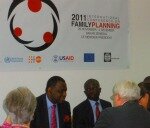October 14, 2011
Sarah Lindsay
 In 1990, the average Senegalese woman had 6.7 children during her reproductive years. By 2009, that number had significantly dropped. According to the Ministry of Health and Prevention, Senegalese women are now, on average, having 4.8 children during their reproductive years. This reduction, taking place over a span of almost 20 years, has been a long time coming as the Senegalese government has been encouraging family planning utilization across the country in state-run hospitals and clinics. In fact, the Ministry of Health and Prevention has doubled its budget for reproductive health. And within the reproductive health budget, UNFPA reports that the proportion donated to family planning has also been doubled.
In 1990, the average Senegalese woman had 6.7 children during her reproductive years. By 2009, that number had significantly dropped. According to the Ministry of Health and Prevention, Senegalese women are now, on average, having 4.8 children during their reproductive years. This reduction, taking place over a span of almost 20 years, has been a long time coming as the Senegalese government has been encouraging family planning utilization across the country in state-run hospitals and clinics. In fact, the Ministry of Health and Prevention has doubled its budget for reproductive health. And within the reproductive health budget, UNFPA reports that the proportion donated to family planning has also been doubled.
Attitudes around family planning use are changing across Senegal, IRIN news reports. “There is a small revolution going on - husbands and imams who were traditionally against any kind of family planning are slowly starting to accept it,” said Ephie Diouf, 31, a child-minder in Dakar. Not only have some religious leaders’ individual attitudes changed, but their outreach to the community regarding family planning is also evolving. Catholic and Muslim leaders are educating people that spacing births by using contraceptives is not against the Bible or the Koran. A midwife from Senegal reported that her local imam now tells families that, “Family planning is not banned in Islam… Religion is about well-being, and spacing children is part of that.”
READ MORE »

 For the 2,200 delegates at the International Conference on Family Planning, the opening plenary featured the president of Senegal and the head of the United Nations Population Fund. But it was two youth leaders who stole the show.
For the 2,200 delegates at the International Conference on Family Planning, the opening plenary featured the president of Senegal and the head of the United Nations Population Fund. But it was two youth leaders who stole the show. At the International Conference on Family Planning, one of the major issues is who will pay for new initiatives. One answer: Both developing and developed countries.
At the International Conference on Family Planning, one of the major issues is who will pay for new initiatives. One answer: Both developing and developed countries.